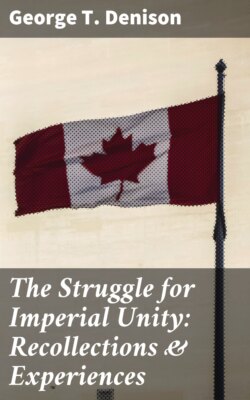The Struggle for Imperial Unity: Recollections & Experiences

Реклама. ООО «ЛитРес», ИНН: 7719571260.
Оглавление
George T. Denison. The Struggle for Imperial Unity: Recollections & Experiences
The Struggle for Imperial Unity: Recollections & Experiences
Table of Contents
PREFACE
INTRODUCTORY CHAPTER
A UNITED EMPIRE
CHAPTER I
CONDITION OF AFFAIRS IN CANADA BEFORE. CONFEDERATION
CHAPTER II
CANADA FIRST PARTY AND HUDSON BAY TERRITORY
CHAPTER III
THE RED RIVER REBELLION
CHAPTER IV
THE RED RIVER EXPEDITION
CHAPTER V
NATIONAL SENTIMENT
CHAPTER VI
ABORTIVE POLITICAL MOVEMENT
CHAPTER VII
THE INDEPENDENCE FLURRY
CHAPTER VIII
THE O’BRIEN EPISODE
CHAPTER IX
THE IMPERIAL FEDERATION LEAGUE
CHAPTER X
COMMERCIAL UNION
CHAPTER XI
IMPERIAL FEDERATION LEAGUE IN CANADA
CHAPTER XII
THE COMMERCIAL UNION MOVEMENT—A TREASONABLE CONSPIRACY
CHAPTER XIII
THE YEARS 1888 AND 1889 THE WORK OF THE IMPERIAL FEDERATION LEAGUE
CHAPTER XIV
THE YEAR 1890
CHAPTER XV
VISIT TO ENGLAND, 1890
CHAPTER XVI
THE GREAT ELECTION OF 1891
CHAPTER XVII
CONTEST WITH GOLDWIN SMITH
CHAPTER XVIII
DISSOLUTION OF THE IMPERIAL FEDERATION. LEAGUE IN ENGLAND
CHAPTER XIX
ORGANISATION OF THE BRITISH EMPIRE LEAGUE
CHAPTER XX
MISSION TO ENGLAND, 1897
CHAPTER XXI
THE WEST INDIAN PREFERENCE
CHAPTER XXII
1899: THE ESTABLISHMENT OF EMPIRE DAY
CHAPTER XXIII
THE SOUTH AFRICAN WAR
CHAPTER XXIV
1900: BRITISH EMPIRE LEAGUE BANQUET IN LONDON
CHAPTER XXV
WORK IN CANADA IN 1901
CHAPTER XXVI
MISSION TO ENGLAND IN 1902
CHAPTER XXVII
CORRESPONDENCE WITH MR. CHAMBERLAIN
CHAPTER XXVIII
CONGRESS OF CHAMBERS OF COMMERCE OF THE EMPIRE
APPENDIX A
APPENDIX B
THE END
INDEX
Richard Clay and Sons, Limited, BREAD STREET HILL, E.C., AND. BUNGAY, SUFFOLK. Footnote
Отрывок из книги
George T. Denison
Published by Good Press, 2021
.....
Mair and Schultz had escaped from prison about the same time. Schultz went to the Lower Red River which was settled by loyal English-speaking half breeds, and Mair to Portage la Prairie, where there was also a loyal settlement. They each began to organise an armed force to attack Fort Garry and release their comrades, who were still in prison there. They made a junction at Headingly, and had scaling ladders and other preparations for attacking Fort Garry. Schultz brought up about six hundred men, and Mair with the Portage la Prairie contingent, under command of Major Charles Boulton, had about sixty men. Riel became alarmed, opened a parley with the loyalists, and agreed to deliver up the prisoners, and pledge himself to leave the loyalist settlements alone if he was not attacked. The prisoners were released and Mair went back to Portage la Prairie, and Schultz to the Selkirk settlement. Almost immediately Schultz left for Canada with Joseph Monkman, by way of Rainy River to Duluth, while Mair, accompanied by J. J. Setter, started on the long march on snow shoes with dog sleighs over four hundred miles of the then uninhabited waste of Minnesota to St. Paul. This was in the winter, and the journey in both cases was made on snow shoes and with dog sleighs. Mair arrived in St. Paul a few days before Schultz.
We heard of their arrival at St. Paul by telegraph, and our committee called a meeting to consider the question of a reception to the refugees. This meeting was not called by advertisement, so much did we dread the indifference of the public and the danger of our efforts being a failure. It was decided that we should invite a number to come privately, being careful to choose only those whom we considered would be sympathetic. This private meeting took place on the 2nd April, 1870. I was delayed, and did not arrive at the meeting until two or three speeches had been made. The late John Macnab, the County Attorney, was speaking when I came in; to my astonishment he was averse to taking any action whatever until further information had been obtained. His argument was that very little information had been received from Fort Garry, and that it would be wiser to wait until the refugees had gone to Ottawa, and had laid their case before the Government, and the Government had expressed their views on the matter, that these men might have been indiscreet, &c. Not knowing that previous speakers had spoken on the same line I sat listening to this, getting more angry every minute. When he sat down I was thoroughly aroused. I knew such a policy as that meant handing over the loyal men to the mercies of a hostile element. I jumped up at once, and in vehement tones denounced the speaker. I said that these refugees had risked their lives in obedience to a proclamation in the Queen’s name, calling upon them to take up arms on her behalf; that there were only a few Ontario men, seventy in number, in that remote and inaccessible region, surrounded by half savages, besieged until supplies gave out. When abandoned by the officer who had appealed to them to take up arms, they were obliged to surrender, and suffered for long months in prison. I said these Canadians did this for Canada, and were we at home to be critical as to their method of proving their devotion to our country? I went on to say that they had escaped and were coming to their own province to tell of their wrongs, to ask assistance to relieve the intolerable condition of their comrades in the Red River Settlement, and I asked, Is there any Ontario man who will not hold out a hand of welcome to these men? Any man who hesitates is no true Canadian. I repudiate him as a countryman of mine. Are we to talk about indiscretion when men have risked their lives? We have too little of that indiscretion nowadays and should hail it with enthusiasm. I soon had the whole meeting with me.
.....